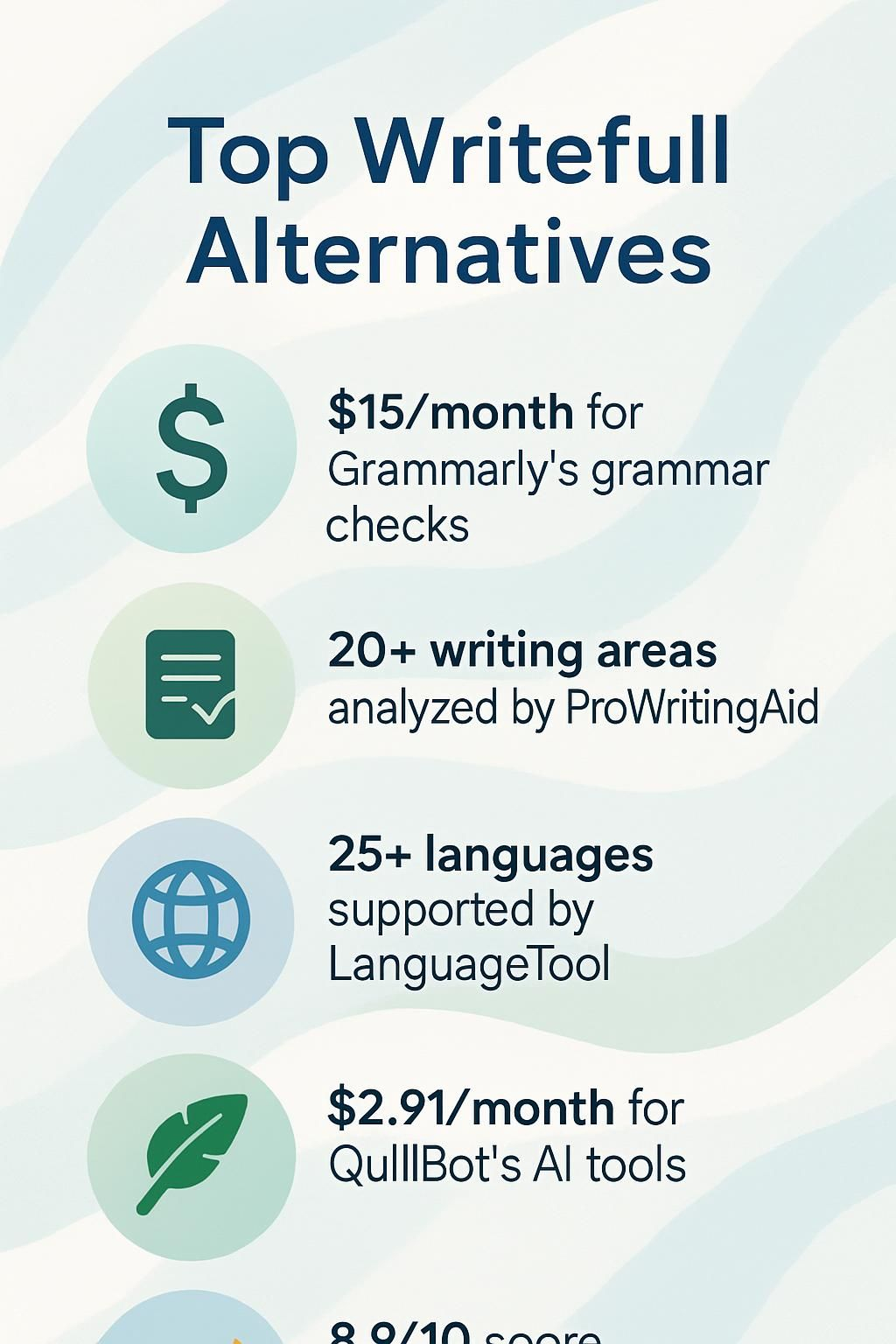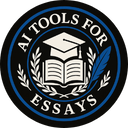Choosing the right grammar checker can feel tricky, especially when Writefull doesn’t meet your needs. Many tools like Grammarly and ProWritingAid offer helpful features for academic writing or tone adjustments.
This blog will guide you through the top Writefull alternatives, comparing their pros, cons, and key highlights. Keep reading to find what fits best!
Key Takeaways
- Grammarly offers real-time grammar checks, tone adjustments, and plagiarism detection for $15/month. It works well on various platforms but has limited free features.
- ProWritingAid provides detailed reports on 20+ writing areas and supports tools like Google Docs. It’s affordable and great for academic projects but may feel complex for beginners.
- LanguageTool is free with multilingual support (25+ languages). It flags advanced grammar issues but limits usage without premium plans starting at $5.01/month.
- QuillBot uses AI to paraphrase, summarize, and improve text clarity affordably (starting at $2.91/month). Its basic features suit students best but lack deep analysis tools.
- Jasper scores high in user reviews (8.9/10) as an alternative tool suitable for small businesses needing automated writing aids or scalability options across devices.

Grammarly
Grammarly is a popular grammar checker used by writers, students, and professionals. It helps fix errors fast while improving writing style and tone.
Key Features of Grammarly
Grammarly is a popular grammar checker. It helps improve writing by spotting errors and offering suggestions.
- Provides real-time grammar checks. Mistakes are highlighted immediately as you type in tools like MS Word or Google Chrome.
- Offers tone adjustments. It ensures your message sounds professional, casual, or friendly based on your needs.
- Includes spell checking for minor spelling corrections. Common typos and misspelled words are corrected with ease.
- Detects plagiarism to promote originality. This feature is valuable for academic writing and articles.
- Integrates across platforms like Firefox, Microsoft Edge, Android, and iOS mobile apps for seamless usage everywhere.
- Suggests sentence structure changes to improve readability. It focuses on clarity and style guides for better communication.
- Offers a free trial for new users to explore its features.
Pros & Cons of Grammarly
Grammarly has become a go-to tool for many writers. It’s packed with features designed to refine writing. Below is a breakdown of its advantages and drawbacks.
| Pros | Cons |
|---|---|
| Real-time feedback improves your speed while editing. | Advanced features are locked behind a paid plan. |
| Works on various platforms, including mobile and desktop apps. | Sometimes, its suggestions miss the intended tone or context. |
| Offers plagiarism detection for originality checks. | May over-simplify complex sentences or writing styles. |
| Cost-effective for small businesses at just $15 per month. | Limited style and readability insights compared to niche tools. |
| User-friendly interface ensures quick adoption. | Free version lacks access to premium writing insights. |
Each feature serves a practical purpose. Users may love its convenience but find it imperfect in certain areas.
ProWritingAid
ProWritingAid checks grammar, spelling, and style in one sweep. It helps polish academic writing without breaking the bank.
Key Features of ProWritingAid
ProWritingAid is a powerful grammar checker and writing tool. It focuses on boosting clarity, style, and readability for all users.
- Offers advanced grammar, spelling check, and style suggestions that go beyond basic corrections. It helps writers create clean, polished work.
- Provides in-depth reports with detailed analysis on over 20 areas like sentence structure, word choice, and pacing. This feature benefits academic writing or professional documents.
- Integrates well with tools like Microsoft Word, Google Docs, and Scrivener. You can edit without switching between platforms.
- Includes tone adjustments that help tailor content to match a specific audience or purpose. This improves engagement in every type of writing.
- Its subscription fee is affordable compared to some Grammarly alternatives while still delivering high-quality features.
- Offers a plagiarism checker as an add-on option for legal papers or academic projects needing originality checks.
- Supports multiple languages for grammar correction including English variations like British or American usage styles.
- Contains helpful features for creative writers such as cliché detection and dialogue tag analysis that improve storytelling flow.
- Works offline with its desktop app; this is useful when internet access may not be available but editing is necessary.
- Provides open access to video tutorials and guides ensuring users understand how to maximize the tool’s ability fully.
Next up, explore the pros and cons of ProWritingAid!
Pros & Cons of ProWritingAid
Transitioning from the key features, it’s time to examine the strengths and drawbacks that stand out for ProWritingAid. Here’s a detailed breakdown:
| Pros | Cons |
|---|---|
| Offers comprehensive reports for grammar, style, and readability issues. | Might feel overwhelming for casual users due to detailed analysis. |
| Integrates seamlessly with Google Docs, Word, and Scrivener. | Requires a paid subscription for advanced features. |
| Provides detailed feedback to help authors improve manuscripts. | Takes longer to analyze text compared to lighter tools. |
| Automates editing for polished, professional consistency. | Interface might feel less intuitive for beginners. |
| Highly beneficial for legal and academic writing projects. | Requires internet connectivity for complete functionality. |
Straightforward yet efficient, the strengths of this tool cater to precision, while its drawbacks point to steep learning curves for some users.
LanguageTool
LanguageTool is a handy grammar checker for both casual and academic writing. It spots errors fast, helping you polish your work with less hassle.
Key Features of LanguageTool
LanguageTool is a helpful grammar checker for multilingual users. It supports over 20 languages and works for both casual and academic writing.
- Offers support for 20+ languages, making it perfect for users who write in different tongues.
- Detects advanced grammar issues, giving more precise corrections than basic tools.
- Identifies spelling mistakes quickly to improve accuracy.
- Includes tone adjustments to match formal or casual settings.
- Works on web browsers, mobile applications, and popular writing platforms.
- Offers free use with optional paid features starting at just $5.01 each month.
- Provides an open-source setup, allowing users to join and improve its functions.
- Enables cloud-based proofreading, offering easier access from anywhere.
- Comes with a free trial of premium tools, helping users decide before buying anything.
Pros & Cons of LanguageTool
LanguageTool is a popular grammar and spell-checking tool. It caters to multilingual users and works across multiple platforms. Below is an overview of its pros and cons:
| Pros | Cons |
|---|---|
|
|
QuillBot
QuillBot helps with rewriting and improving text. It’s fast, simple, and great for writers who want to polish their work.
Key Features of QuillBot
QuillBot is an advanced grammar checker and writing tool. It uses AI to improve your content quickly and effectively.
- Offers paraphrasing features that reduce redundancy and boost clarity in writing.
- Checks grammar, punctuation, sentence structure, and vocabulary with precision.
- Provides tone adjustments to match academic or casual styles easily.
- Includes summarization tools to condense lengthy content without losing meaning.
- Features a built-in plagiarism checker to maintain originality in work.
- Suggests alternative phrasing for better word diversity and flow improvement.
- Uses AI-powered machine learning to catch mistakes others may miss efficiently.
- Priced competitively at $2.91 per user with a free trial option available for testing its benefits firsthand.
Pros & Cons of QuillBot
QuillBot shines with its budget-friendly pricing, starting at just $2.91 per user. Its AI-driven tools for paraphrasing and summarizing make it a go-to grammar checker for students and academic writing tasks. It enhances content by diversifying sentence structure and language use, offering more polished results. The free trial lets users explore features before deciding to buy a plan.
On the flip side, some premium features sit behind paywalls, which might turn off those seeking free options. While excellent for improving both grammar and style, its advanced abilities may feel too basic for professionals needing deep analysis like Hemingway Editor or other Grammarly alternatives. Still, it strikes a balance between affordability and functionality that many users appreciate on their writing journey!
Comparison with Other Alternatives
Grammarly Business and Textio work well for enterprises needing scalable grammar checkers. Both are cloud-based, offering flexibility across devices. Ginger is another strong contender, with mobile apps available for iOS and Android users. For tighter budgets, free tools like LanguageTool or Plagiarism Checker X may fit the bill but come with limits on features.
Jasper stands out for small businesses. Created by Conversion AI in Austin, it scores 8.9/10 in user reviews. Tools like Copyscape or iThenticate ($100 one-time fee) focus on plagiarism detection rather than tone adjustments or style suggestions. Each alternative serves different needs; choosing depends largely on writing type and budget constraints.
Conclusion
Choosing the right writing tool depends on your needs. Whether it’s grammar checks, tone tweaks, or plagiarism detection, there’s something for everyone. Tools like ProWritingAid and LanguageTool offer great features at fair prices.
For simpler tasks, QuillBot or Grammarly might work better. Explore these options to find what fits you best!
FAQs
1. What are some top Writefull alternatives for academic writing?
There are several options to explore. Grammarly is a popular choice for grammar checking and tone adjustments. Hemingway Editor helps simplify complex sentences, making your work clearer.
2. How do these tools compare to Writefull in grammar checking?
Writefull focuses on language patterns in academic texts, but alternatives like Grammarly provide broader grammar checks across various writing styles, including casual or professional tones.
3. Can I use these alternatives for more than just academic writing?
Yes, many of these tools work well beyond academics. For instance, Hemingway Editor improves readability for blogs or articles, while Grammarly adjusts tone based on the audience.
4. Are there free options among Writefull alternatives?
Yes! Some tools offer free versions with limited features. For example, Phosphorus might not be as well-known but could be worth trying if budget is a concern when exploring new software solutions.

